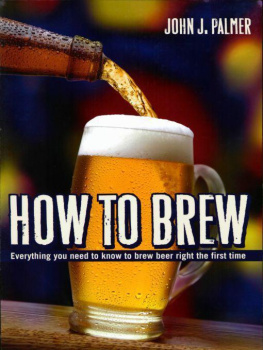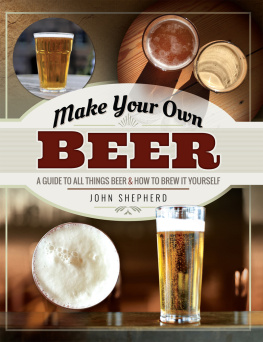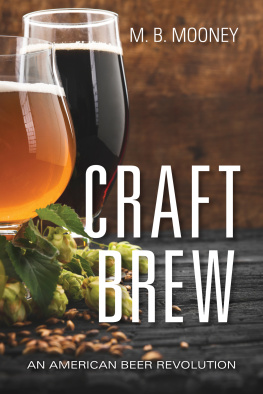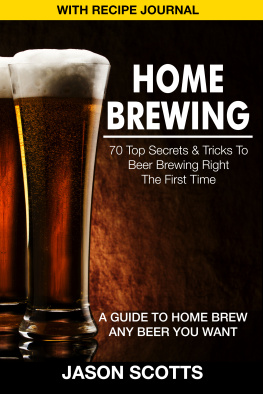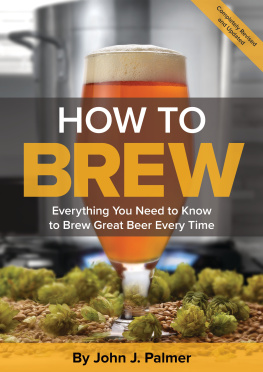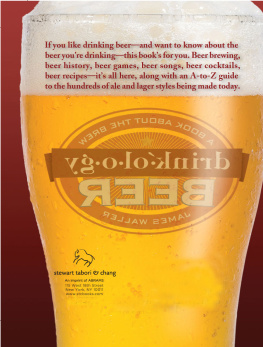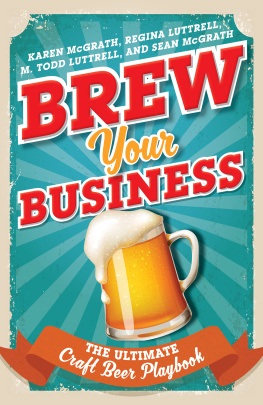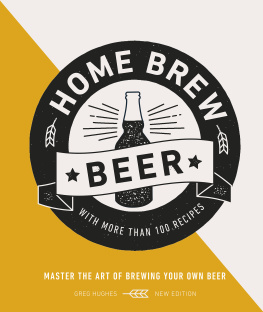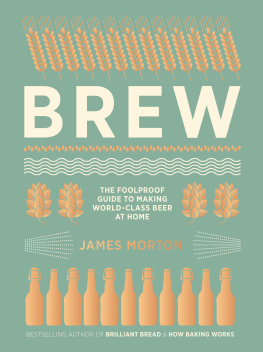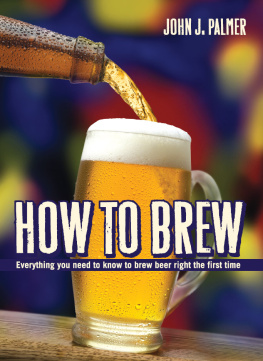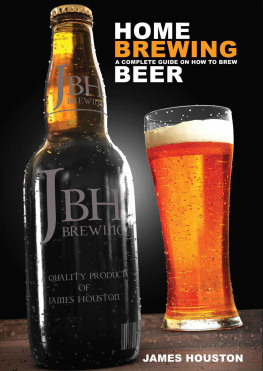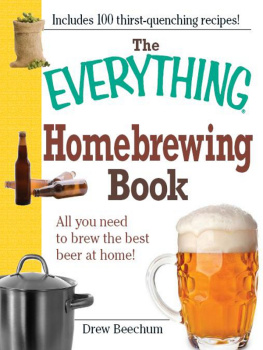Table of Contents


Brewers Publications
A Division of the Brewers Association
PO Box 1679, Boulder, Colorado 80306-1679
www.beertown.org
2006 by John J. Palmer
All rights reserved. No portion of this book may be reproduced in any form without written permission of the publisher. Neither the author, editor nor the publisher assume any responsibility for the use or misuse of information contained in this book.
Printed in the United States of America.
10 9 8 7 6 5
ISBN-13: 978-0-937381-88-5
ISBN-10: 0-937381-88-8
Library of Congress Cataloging-in-Publication Data
Palmer, John J., 1963-
How to brew : ingredients, methods, recipes and equipment for brewing beer at home / by John J. Palmer.- 3rd ed.
p. cm.
Includes bibliographical references and index.
ISBN-13: 978-0-937381-88-5
1. BrewingAmateurs manuals. 1. Title.
TP570.P275 2006
641.873-dc22
2006004807
Publisher: Ray Daniels
Technical Editor: Randy Mosher
Copy Editor: Daria Labinsky
Index: Daria Labinsky
Production & Design Management: Stephanie Johnson
Cover and Interior Design: Julie Lawrason
Cover photo: Souders Studios/Square Pixels
Interior photos: Naomi K. Palmer and John Palmer
ACKNOWLEDGEMENTS
This book is dedicated to all my brewing friends all over the world. I couldnt have done it without your enthusiasm and support.
I am constantly overwhelmed by the generosity of brewers in sharing information, their time, and their passion for beer and brewing. There are so many people I need to thank for making this third edition possible.
My wife, for raising an eyebrow and saying, Well...? (Get going!)
My friends in the Crown of the Valley Brewing Club: Tim Aberle, Herb Adams, Michael Babcock, JT Blancett, Brian Dearden, Jeff Crowell, Bob Curtiss, Brian Dellosa, Bob Gunner, Erik Kobulnick, Dale Lauterbach, Shawn Olsson, Doug Parker, Mike Peterson, Todd Peterson, James Reynolds, Andrew Sayeg, Jamie Smith, Robert Streutker, Paul Valvidiez, Scott Velasquez, Vitol Wiacek, for friendship, project support, and good beers.
There are several people that I would pester with phone calls and late night emails to answer tough questions, and they had a real hand in helping me develop this book:
A.J. deLange
Steve Alexander
Bob Hansen of Briess Malt & Ingredients Company
Brian Kern
Berne Jones, Ph.D, of the U.S. Department of Agriculture
Evan Evans, Ph.D, of the Tasmanian Institute of Agricultural Research
Greg Doss of Wyeast Laboratories Inc.
Chris White of White Labs Inc.
Mark Jilg and Todd Peterson of Craftsmen Brewery
Matt Brynildson of Firestone Walker Brewery
And I want to thank Ray Daniels and Randy Mosher for enthusiastically getting behind the third edition and asking the tough questions that made it better.
John
October 5, 2005
Notes on the Third Edition
How to Brew Your First Beer was created in 1993 as a twelve-page electronic document that contained everything that a beginning brewer would need to know to get started. It contained equipment descriptions, process descriptions, and some of the whys of homebrewing. I posted it to electronic bulletin boards and homebrewing ftp sites such as sierra.stanford.edu . (Would you believe that the World Wide Web didnt exist back then?) It was written to help the first-time brewer produce a foolproof beerone he or she could be proud of. That document apparently served quite well; it was requested and distributed to every continent (including Antarctica) and translated into Spanish, Italian, Czech, Korean, and Japanese. Glad I could help.
As time went by, I received requests from brewers to write how-tos for the more complex brewing methods, such as extract-and-specialty-grain and all-grain brewing. There is a lot to talk about with these methods, though, and I realized that it would he best done with a book. After years and years of writing and rewriting, 1 published the first edition of How to Brew online with the help of the Real Beer Page in June 2000. But I immediately started receiving requests for hard copy. Of course, in the process of laying it out, I couldnt resist the chance to improve it. The second edition was self-published in 2001. It added different sparging techniques and a more technical discussion of fluid flow in the lauter tun, as well as more pictures and data tables than the online edition.
Since that time, there have been a couple of changes in the state-of-the-art of homebrewing:
The brewing quality of malt extract has been improving for more than a decade and is, in fact, excellent, but the basic extract brewing methods have gone unchanged since we brewed with bakers extract.Batch sparing and no-sparge methods for all-grain brewing are now as popular as the continuous-sparging method, which used to be the only method discussed in the literature.
To give these changes their due, I had to rework most of the chapters of the book. Sometimes it was just a sentence or two, other times it was the entire presentation of the chapter.
This was also an opportunity to improve on topics I had only touched on before:
Brewing sugars other than maltoseBeer clarity and controlling beer hazeBeer color and how to estimate it in a recipeAcid calculations for controlling mash and sparge pH.
I also re-took a few pictures.
Cheers!
John
INTRODUCTION
Perhaps you have heard this before:
You brew your own beer?
Yes.
Really? Wow ... what does it taste like?
Its really good.
Can you make Budweiser?
Yes, and every other kind of beer, too.
You know, I have always wanted to try doing that....
Hello and welcome to the third edition of How to Brew. This book is going to introduce you to the art and science of brewing, great beer, and a fascinating hobby. You will truly amaze your friends! Brewing good beer is not hard.
This is how the brewing process works:
1. Malted barley is soaked in hot water to create fermentable sugars.2. The malt sugar solution is boiled with hops for seasoning.3. The solution is cooled, and yeast is added to begin fermentation.4. The yeast ferments the sugars, releasing carbon dioxide and ethyl alcohol.5. When the main fermentation is complete, the beer is bottled with a little bit of added sugar to provide the carbonation.
Sounds fairly simple, doesnt it? It really isnt any harder than baking a batch of cookies. What is difficult is understanding how to make cookies when you have never seen it done before. The goal of this book is to teach you how to brew beer in as logical and straightforward a manner as possible without burying you in scientific details. When you have read this book, you will understand what you are doing, why you are doing it, and how to do it easily
In this first section of the book, we are going to lay the groundwork for the rest of your brewing education. As with every new skill, it helps to learn to do things the right way the first time, rather than learning via short cuts that you will have to unlearn later on. On the other hand, you dont need to know how an internal combustion engine works when you are learning how to drive. You just need to know that it needs gas and oil to work.
To learn to brew beer, you dont need to learn how the yeast metabolize the malt sugars, but you do need to understand that eating sugar is what they do, and you need to understand what they need from you to get the job done. Once you understand that, you can do your part, they can do theirs, and good beer will happen. As you gain some familiarity with the brewing processes, you can delve deeper into the inner workings and probably make your beer even better.
Next page
